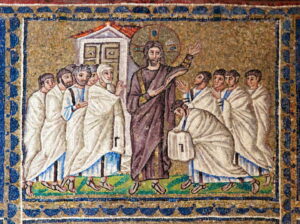Fr Neil’s homily on the Sunday after Easter, 24 April 2022
The Sunday after Easter has been given many different names: Second Sunday of Easter, Low Sunday, Divine Mercy Sunday, Quasimodo Sunday, Bright Sunday and Dominica in Albis or White Sunday.
Those who were baptised had the tradition of removing their clothes before their baptism and as they emerged from the baptismal waters being clothed in white garments. The candidates were expected to wear their white garments through the whole of the Easter Octave. This Sunday became known as Dominica in Albis or White Sunday as it marked the last day those baptised at Easter wore the white garments.
In our Gospel account¹, we see the disciples hidden together in a locked room through fear. We remember the image of Adam and Eve, who after the Fall hid from God through fear and the shame of their nakedness. In an attempt to cover their shame they sowed fig leaves together.²
Part of God’s response is to provide Adam and Eve with a better means of covering their nakedness. God’s use of animal skins to cloth them marked the beginning of the cultic practice of humanity offering the lives of other animals as a means of covering — however imperfectly — humanity’s sin and shame in the loss of innocence after the Fall.
Christ’s first words to the disciples in his resurrection appearance are “Peace be with you.”³ There is something more going on here that a polite means of engagement. Yes of course the disciples would be at a loss as to understand what was happening when Christ came and stood among them. Thomas’s doubt is not unreasonable in response to what must have seemed an act of collective madness on the part of the other disciples. Christ addresses Thomas’s doubts directly in the most tangible way: “Put your fingers here” and “Put out your hand and place it in my side.” Faith and hope are not “fool’s gold” but are prerequisites to encounter the divine love found in the Risen Christ.
The words “Peace be with you” are words that are meant to reassure and to address the disciples’ fear. I am reminded of Julian of Norwich’s famous phrase “all shall be well and all manner of thing shall be well.”⁴
Christ directly addresses their fear. They need no longer hide in an attempt to cover their fear, shame and alienation from God, a result of the Fall. They are to be reclothed with a dignity that belongs only to those who are the children of God, and as children of God they are to stand in a freedom, joy and peace that the world cannot give — or take away. This clothing will not however be the skins of other animals, but as Christ himself says in Luke 24:49 “Stay in the city until you are clothed with power from on high.”
This reclothing with a renewed dignity has been directly bought about because of the sacrifice of Christ and his glorious resurrection. We are to be clothed in Christ by our participation in his death and rising again. In the sacrament of baptism we state: “you have become a new creation, and have clothed yourself in Christ. See in this white garment the outward sign of your Christian dignity.”
It is not insignificant that the bishop at the Chrism mass breathes on to the holy oil of Chrism. Directly after baptism the candidate is anointed with that oil and these words: “He [God] now anoints you with the chrism of salvation.” In the Gospel Christ breathes on the disciples with the words “receive the Holy Spirit.” As God knelt in the dust of his creation and breathed life into Adam, so Christ breathes the breath of new life into his disciples as they prepare to be clothed from on high.
The freedom that this peace and the clothing from on high gives will enable the disciples to come out from the shadows and proclaim the gospel with courage. They are given authority to bind and loose, forgive or retain sins, that others might find their way to Christ and be reclothed and made fit for eternal life in the new kingdom of God’s glory. The gift we are to embody and proclaim is that in Christ we no longer have to hide because of our fear and shame as we are reclothed in the freedom and joy of the liberty of the children of God.
¹ John 20:19–31
² Genesis 3:7
³ John 20:26
⁴ Julian of Norwich: Revelations of Divine Love








 Posts
Posts